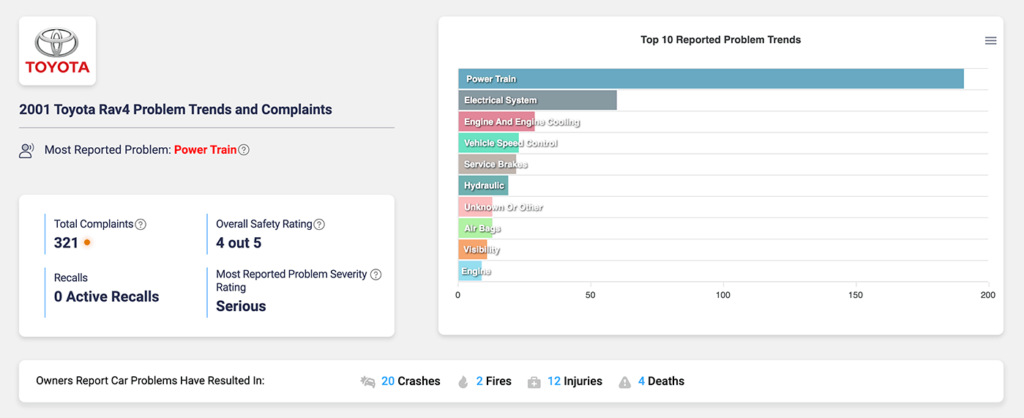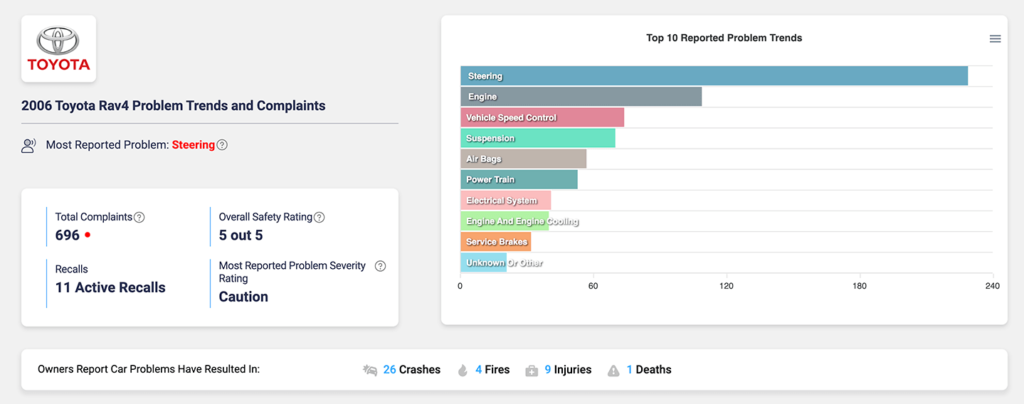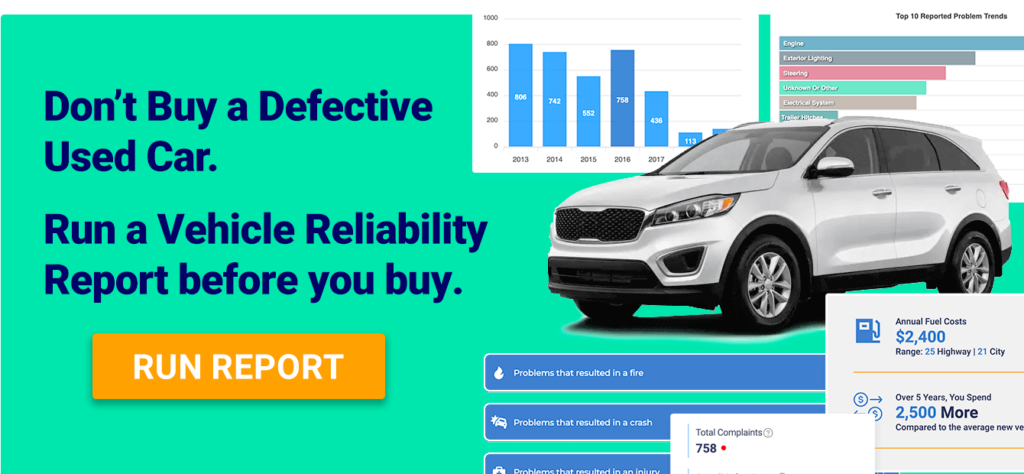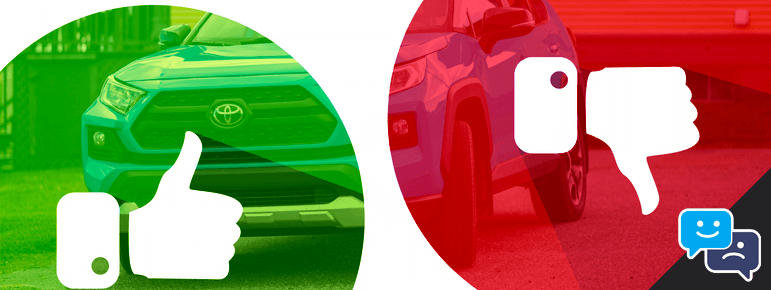The Toyota RAV4 has a compact infrastructure, good fuel economy, and respectable cargo space. Of course, with any vehicle, you want to be careful what years you buy. Here’s a comprehensive overview of what Toyota RAV4 years to avoid.
Out of all the Toyota Rav4 years to avoid, by far the two model years with the most reported problems was the 2006 and 2019 Rav4s. Both these model years tend to have costly problems, including steering problems, engine oil consumption issues, and fuel system problems.
As one can imagine, each Rav4 generation has their own set of problems. Some more serious than others.
And if you’ve been looking into buying a Toyota Rav4, you’re probably already aware of the SUV’s many advantages. Great fuel economy, excellent safety ratings and overall reliable performance.
However, that doesn’t mean all Rav4 models maintain these standards over time. In fact, certain years of the Rav4 may be best avoided if you want to stay out of the repair shop.
In this article, we’ll go over in detail which Toyota RAV4 years to avoid and why. We will take a look at common issues reported by owners. So when it comes time to purchasing a Rav4, you can make an informed decision.
Let’s jump into this!
Why Avoid 2001-2003 Models of the Toyota Rav4?
Earlier RAV4s have struggled with power train problems. Problems that can be dangerous, such as sudden and unintended acceleration. Or another common complaint is the transmission jumping into gear.
Other common problems to be aware of with these years are poor acceleration and electrical system problems.
Safety Concerns
More importantly, the RAV4s from 2001 to 2003 have poor side crash test reports, according to the Insurance Institute of Highway Safety. It was only in 2004 that additional stability control was added, so exercise caution if you’re looking at models from these years.
In fact, owners of this era of Rav4 have reported that problems resulted in 20 crashes, 2 fires, 12 injuries, and even 4 deaths.
If you are considering a 2001-2003 generation of Rav4, do your research before purchasing.

View 2001-2003 Toyota Rav4 Dependability and Safety Report
Why Avoid 2006-2008 Toyota RAV4s?
2006-2008 RAVs experienced some problems with engines and steering shafts due to an inefficient design. Not only can these problems can be costly, but also a safety concern.
Owners often report of steering problems that begin with a mild “popping sound” coming from the steering wheel. Over time, owners report that the popping sound progressively gets louder.
After much research, it turns out the popping sound is due to a defective steering linkage. If considering this model year, make sure the previous owner has had this item replaced.
This is important, as owners have reported being involved in an accident due to this defect.
While my son was driving me the vehicles steering wheel locked and he was unable to steer the vehicle. It caused us to go off the road down a steep hill and wreck. I’ve never had any problems with this vehicle so it was completely unexpected. If there had been anyone in our path we wouldn’t of been able to stop from hitting them. It has not been inspected but there are witnesses to the accident
More complaints can be found here: 2006 Toyota Rav4 Reliability and Safety Report.
Oil consumption is yet another common issue with the 2006-2008 Rav4s with the 2az-FE engine. Owners report the pistons contain a design flaw that allows oil leakage, causing the oil to find its way into the combustion chamber.
As such, even if you find a 2006 to 2008 RAV with a history of engine repair, you may not be spared the expense of repairing it again.
Safety Concerns
The 2006-2008 RAV4 earned the highest rating possible from the National Highway Traffic Safety Administration (NHTSA). They gave it a staggering 5 out of 5 stars.
It’s a sure sign that this car went through rigorous standards and checks to ensure safety. This is wonderful news for anyone considering making an investment in this model year Rav4.
If you are considering a 2006-2008 generation of Rav4, do your research before purchasing.

View 2006-2008 Toyota Rav4 Dependability and Safety Report
Why Avoid 2009-2012 Toyota Rav4s?
The third-generation RAV4s from 2009 to 2012 have a serious problem with acceleration, namely that the accelerator has been reported to override the brake power, leading to accidents.
The unintended acceleration issue was where the vehicle would suddenly accelerate without the driver intending to do so. While this issue was also prevalent in the earlier model Rav4’s, the problem was particularly widespread in the 2009-2010 model years.
The problem was linked to faulty accelerator pedals and floor mats that could cause the accelerator to become stuck in an open position.
To correct the defect, Toyota recalled millions of RAV4s to address the acceleration problem. The company also faced fines and legal action related to the issue.
It’s worth noting that Toyota has since addressed the issue through recalls and other measures. However, if you’re concerned about the safety of a particular Toyota RAV4 model, get a hold of the VIN number. Then with the VIN number in hand, run a recall search to see if this dangerous fix was performed.
Be wary of this issue when buying a 2009 to 2012 RAV4.
If you are considering a 2009-2012 generation of Rav4, do your research before purchasing.

View 2009-2012 Toyota Rav4 Dependability and Safety Report
Why Avoid 2013 Toyota Rav4s?
These RAV4s have reported problems with torque converters, a costly design error that can cost thousands to fix.
In fact, owners have reported that the cost for this repair has ranged between $4,000 to $4,500.
Without getting too technical, the a torque converter is a type of fluid coupling used in automatic transmissions to transfer power from the engine to the transmission.
When the torque converter goes bad, it will cause problems with a vehicle’s transmission. Problems such as slipping, shuddering, and overheating. It can also lead to poor fuel efficiency and strange noises.
Sometimes the issue may trigger the check engine light, but not always. Be sure to properly test drive the vehicle.
This model year is also prone to other minor problems like decreased visibility and infotainment malfunctions, too.
However, if the torque converter has been replaced, and the vehicles software is up to date, this may be a good buy.

Safety Concerns
The 2013 model year of Rav4 didn’t walk away with the highest safety rating from the National Highway Traffic Safety Administration. It only scored four out of five stars overall.
However, that’s better than average, surely…but it isn’t quite up to par when compared to previous years of the same model. Food for thought when considering investing in one.
Why Avoid 2019 Toyota Rav4s?
The 2019 model sees the return of transmission problems for the RAV4, with hesitating, lurching, and rough gear shifts a common issue.
Fuel system problems seem to be an unwelcome addition to many owner’s experiences with their Rav4. It has left them stranded at the most inopportune moments, such as when driving on busy highways.
The engine on my Rav4 suddenly stopped without any notification while I was driving it on the freeway. I could have been severely injured from the risk of being rear ended by vehicles behind me. I have experienced this twice now, and both times, I have been on a busy highway in the middle of rush hour traffic.
More complaints can be found here: 2019 Toyota Rav4 Reliability and Safety Report.
Leaving drivers frustrated and wary of other potential risks of breaking down is something no driver ever wants to encounter while out and about.
And last but not least, this model of RAV4 also experiences braking problems, too.
If you are considering a 2019 Rav4, do your research before purchasing.

View 2019 Toyota Rav4 Dependability and Safety Report
Safety Concerns
The 2019 Rav4 wasn’t the top contender when it came to safety ratings from the NTHSA; it only earned 4 out of 5 stars. That’s great, sure, but there are other model years that have achieved higher scores.
So, if safety is at the top of your must-have list for picking a car, this might be a factor you’ll want to consider during your search.
When asking the question, which Toyota RAV4 years to avoid – the 2019 model should be on the list.
Final Thoughts: Toyota RAV4 Years to Avoid
All in all, no matter what car you’re looking to buy, it’s always important to consider the age, price and service history of the vehicle. Having said that, if you do plan on purchasing a Toyota RAV4, be sure to take extra precaution when evaluating it for quality and safety issues.
Even though Toyota has an impressive reputation for reliability and quality assurance, there have been reports of poor quality control in certain model years of the RAV4.
To ensure that you are making the most informed decision before signing on the dotted line and committing to a purchase, verify potential cars by running a reliability and safety report.
At the end of the day, your safety is what really matters so don’t skip this step!

Managing Editor
Christopher is an automotive technical writer. When he’s not at the local autocross event, he can often be found working on one of his cars. Specializes in automotive class action law, industry trends, and automotive maintenance. Email me direct, or learn more about us

